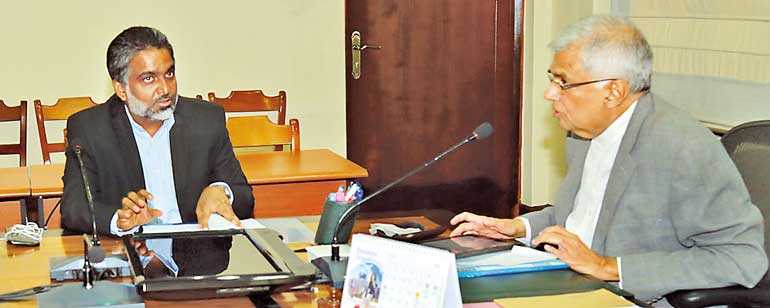Wednesday Feb 18, 2026
Wednesday Feb 18, 2026
Tuesday, 21 May 2019 00:00 - - {{hitsCtrl.values.hits}}

Prime Minister Ranil Wickremesinghe (right) discusses the findings on the controversial Batticaloa Campus with Prof. Ashu Marasinghe
Prime Minister Ranil Wickremesinghe yesterday said the Government will take steps to bring madrasas under the Education Ministry.
Wickremesinghe reiterated that the Government will not allow the establishment of Sharia universities, but will amend the Universities Act to allow students to have access to higher education opportunities, regardless of their ethnicity or religious identities.
“The Amendment will draw from legislation already existing in Bangladesh, and will be done after discussions with Muslim ministers. In Bangladesh, these universities are categorised as private universities. There is no need for Sharia universities in Sri Lanka, and they cannot be established under our law,” Wickremesinghe said.
He made these statements during a discussion at Temple Trees where, UNP parliamentarian Prof. Ashu Marasinghe presented the findings of the controversial Batticaloa Campus Ltd. by the parliamentary Sectoral Oversight Sub-Committee on Higher Education. Prof. Marasinghe is a member of the Committee and said the full report of their findings will be presented to Parliament in the first week of June. He said the Committee’s recommendation was that the Batticaloa Campus Ltd. will be established as a private university, but with the oversight of the Government.
In the second week of May, the first draft of the Madrasa Education Regulatory Bill was presented to Cabinet by Muslim Religious Affairs Minister M. H. A. Haleem.
The draft proposed to set up a board of nine members, appointed by the Minister of Muslim Religious Affairs, who will be responsible for the regulation of all madrasa education once the Act is passed.
The Cabinet, which had initiated the process of drafting legal framework in motion in March, with recommendations to update two existing Acts, fast-tracked the process after the Easter Sunday explosions.
Following discussions, instead of updating existing laws, it was then decided to introduce a new Act to regulate the schools, which have not been properly regulated to date. At present, madrasas function at the private level with no regulatory mechanism in place by the Muslim Religious and Cultural Affairs Ministry or any other.
The first draft of the Bill also proposed the legal framework to form a nine-member committee called the Sri Lanka Madrasa Education Board for organisation, regulation, supervision, control, development, and improvement of madrasa education in the country.
The appointed board will monitor and regulate the schools and the curricula taught, and put a common system in place. The Bill has been drafted after studying regulations set in place in India and Bangladesh, and the system in place to regulate pirivena education.